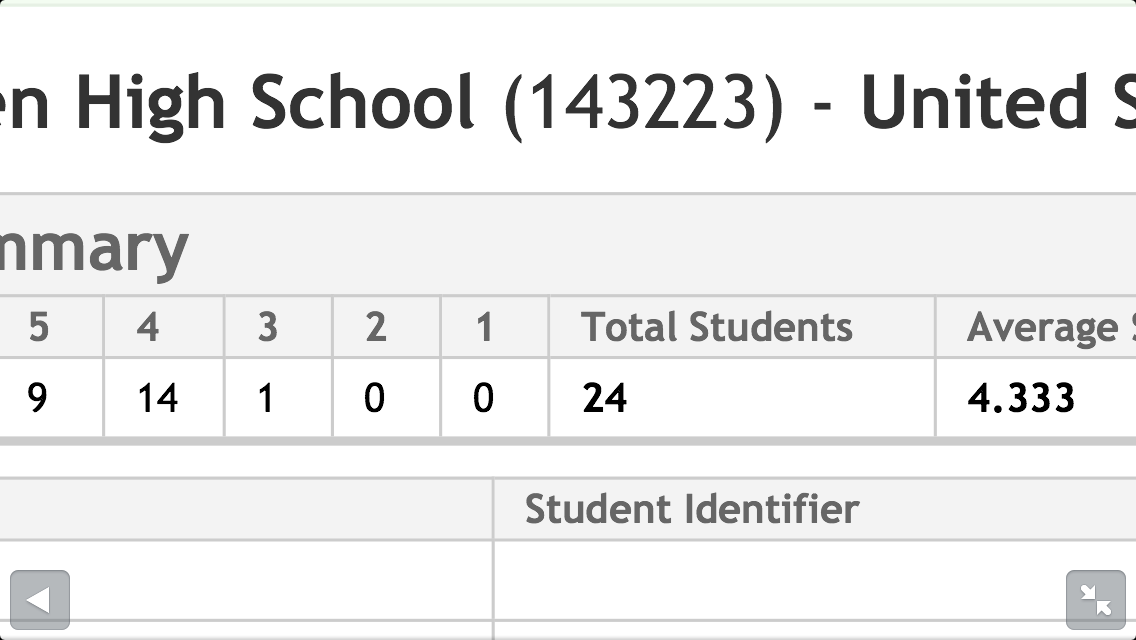Today my students received their AP US History scores from the college board. Our class average was a 4.33 on the toughest exam the AP offers. Every student in my class took the test and every student is getting college credit for passing it. Finally we may have figured out what George W. Bush meant by, "No Child Left Behind..." I digress. Obviously we are excited and we are proud that our kids got the scores they truly deserved. I've been humbled by it all and refuse to accept the fact that I am a great historian or teacher because of these scores. I work around great minds and educators that intimidate me with how good they are in the classroom. So what is it then? How do you build a culture of success? I guess I am left with these 3 things...
1. Your classroom culture determines motivation- and a motivated student can do anything.
 How do you get kids to do what you want them to do? Scare 'em? You could discipline them. Maybe hold a grade over their head as motivation. Or, you could build a culture where success is the only option. Exactly how we do that is a bit puzzling to me, and articulating it also can be troublesome- all of which probably means that I will be a lousy administrator someday. But creating a positive and successful culture is not a magic potion that you can hand to a teacher or school leader and say, "drink this." Our culture we build in our classroom is just "how we roll."
How do you get kids to do what you want them to do? Scare 'em? You could discipline them. Maybe hold a grade over their head as motivation. Or, you could build a culture where success is the only option. Exactly how we do that is a bit puzzling to me, and articulating it also can be troublesome- all of which probably means that I will be a lousy administrator someday. But creating a positive and successful culture is not a magic potion that you can hand to a teacher or school leader and say, "drink this." Our culture we build in our classroom is just "how we roll."
But what we can do as administrators and educators is this-
*We can be relentless with our expectations. We work in a business that raises the bar, not lowers it. Have faith and believe that people can surpass your expectations. We aren't supposed to stack up with some of the best students in the nation. But we do, because we expect to.
*We can be real with each other. Being honest with our coworkers and with our students makes us real. I tell my students when I'm having a bad day. They do the same. We celebrate each others' accomplishments and build a culture of understanding and compassion for each other. We are unfailing in our support for each other. Once someone knows you care about them, they just seem to care a little more about you.
*We can be consistent. If there is a trait that is more desirable in education, I guess I haven't found it yet. Ya know, it must be nice to Yankees or Patriots fan because they are just consistently good every year. But students should expect us to be on point. They deserve our energy and our consistent effort. They begin to model those same habits in their work. Their work is a reflection of our preparation and our consistency.
* And finally, we can run through a wall for each other. This is our class motto. I won't say no to you and you won't say no to me. I will stay after school to help you and you will stay after school to get help. You will email me your questions at 10 p.m. and I will respond. Like any good team, we trust in the guy next to us to do their job. I want the students to succeed. And they want me to be able to write this blog in July bragging about their success.
2. Success works vertically and horizontally.
We don't teach in a vacuum. My students are more prepared for success on these standardized tests than ever before because they are getting incredible instruction as freshmen and sophomores and building skills that they will need to be successful at our level. The more time we spend collaborating and scaffolding vertically with other teachers, the better odds for successful student outcomes.
As the common core ascends upon us, its vital to keep working in interdisciplinary teams too. Horizontal collaboration with my fellow English colleagues has been a foundational part of our success. Kids are getting the same instruction, using the same terminology, and realizing that we have the same expectations across our classes. That could mean a little more work and a little more flexibility for us as teachers, but we are clearly realizing the benefits. The proof is in the pudding.
3. Professional Development works.
School districts and teachers have to support and engage in professional development. Before I started teaching this class, I engaged in the following professional development activities:
1. Two year Literacy Liaison training
2. Two year Technology Liaison training
3. OAH, NCSS, AHA, and AP conferences around the country
4. 1 on 1 course work and countless phone calls with my mentor who had taught the class before
5. American Dreams History Grant
6. Bureau of Education Seminars
7. George Couros' Connected Educator Seminar
8. Google Training
If school districts want successful programs, they have to provide professional development opportunities for their staff. I've improved at my craft because of the opportunities I've been afforded by my district and my boss. There has to be trickle down affect to my students, because I've sort of run out of explanations for all this. I guess that is just how we roll.
http://www.wordle.net/show/wrdl/6879909/Culture_of_Success







No comments:
Post a Comment